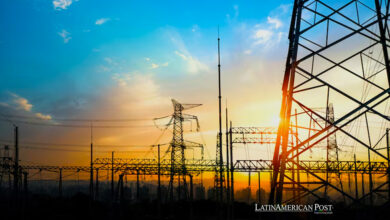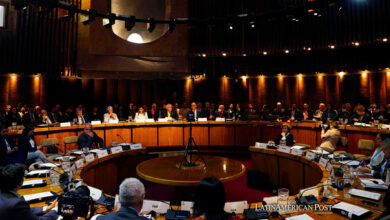Why Do Economic Leaders Care More About Climate Change Than Inflation?
The annual report of the World Economic Forum in Davos revealed that economic leaders fear climate change even more than inflation

Photo: Weforum.org
LatinAmerican Post | Vanesa López Romero
Last January 11 The Davos Economic Forum published its 2022 Global Risk Perception Studywhere they reveal what the main global risks are and what their impact would be. This report surveyed 1,183 economic experts around the world. world to define what these global risks are.
In the list the following risks are found in the first ten positions. These are ranked from highest to lowest risk:
1. Effects of climate change
2. Extreme weather
3. Biodiversity loss
4. Erosion of social cohesion
5. Livelihood crises
6. Infectious diseases
7. Human damage to the environment
8. Natural resource crisis
9. Debt crisis
10. Geo-economic confrontation
Fear of climate change takes the lead
As we can see, 5 of the risks in the list are directly related to the environment. Likewise, the first three places are occupied by problems of this type. More than 84% of those surveyed classified the effects of climate change as the greatest risk. But, why is the climate crisis an economic concern?
According to the report, the risks that have to do with the environment have “the potential to destabilize the financial system and the volatility of assets”. It is also pointed out that if action is not taken quickly, climate change could reduce world GDP by a sixth.
On the other hand, the economic crisis as a result of the climate crisis results in a wide increase in inequalities, since its consequences first affect the poorest and most vulnerable regions of the world. A clear example of this is the Amazon, which today produces more carbon dioxide than it can absorb and is about to go from being a tropical forest to a savannah. The economic and exploitation activities that they have more repercussion is this is not only done by Latin American countries, however these are the first to experience the consequences at a social, environmental and economic level.
To this we must add that the crisis due to COVID-19 and, consequently, the desire for economic reactivation imply an excessive use of natural resources and production processes that pollute.
Also read: What Would Happen If the Amazon Turns Into A Desert?
What needs to be done and changed?
We must bear in mind that this is not the first time that the effects of climate change enter this list. In fact, since 2011 this is an item that has not ceased to be present. But that was also the year he was present for the first time.
The climate crisis is not something we have seen for just a decade. Different social and scientific movements around the world have insisted since the last century on paying attention and taking action around this problem. Unfortunately, they have been silenced and consequently we find ourselves with ineffective actions that endanger the human integrity and its environment.
The failure of the fight against climate change leaves much to be desired. However, the efforts made at the international level and, of course, at the individual level have yielded results, but these are still far from what is expected. That is why, since the report, companies and governments around the world were invited to take action and create policies that are not only short-term, but that are permanently incorporated into their action agendas.
It is time for governments to present more ambitious climate action plans that give tangible results and that can be an example for others.





